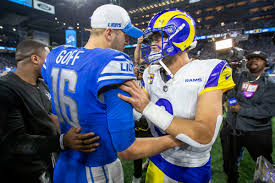- Mm
Stop the Narrative: Jared Goff Isn’t the Victim in the Rams’ Story
For far too long, Jared Goff has been painted as a sympathetic figure in the narrative surrounding his exit from the Los Angeles Rams. The popular version goes like this: Goff, the discarded quarterback, was unceremoniously shipped off after pouring his heart into the franchise. Meanwhile, the Rams are seen as the cold villains, replacing him with Matthew Stafford in pursuit of a title.
But that version doesn’t tell the whole truth.
In the first episode of Netflix’s Quarterback Season 2, we get a clear glimpse into how Goff sees it:
> “So 2020 season happens, three weeks after the last game of the season, I get a call from [Rams coach] Sean [McVay], and really did not expect anything. He lets me know they’re trading me to Detroit and I’m like, ‘Oh, whoa, OK, alright,’ what the hell, what’s happening?’ And I would say about 30 seconds after that phone call, it was on Twitter.”
.
The scene is emotional, meant to spark empathy. But to understand what really happened, let’s rewind the tape.
After the Rams lost 13–3 to the Patriots in Super Bowl LIII, the organization made a massive investment in Goff. In 2019, they handed him a four-year, $134 million contract extension with $110 million guaranteed—the most guaranteed money ever given to an NFL quarterback at the time.
…
That investment came with expectations. Unfortunately, the version of Goff that showed up post-Super Bowl wasn’t the same player.
..
Here’s how his performance broke down:
Before the extension (2017–2018):
QB Record: 24-7 (.774)
TD/INT: 60/19
Sacks: 58
Game-winning drives: 5
After the extension (2019–2020):
QB Record: 18-13 (.580)
TD/INT: 42/29
Sacks: 45
Game-winning drives: 3
The decline was real. He became inconsistent, turnover-prone, and lacked the urgency expected of a franchise quarterback who had just been paid like a superstar. While Goff occasionally acknowledged the need to improve, there wasn’t a visible shift in energy or accountability. Compare that to Aaron Donald, who responded to his extension by playing with even greater dominance.
..
Let’s not forget, Goff couldn’t defeat the winless 0-13 Jets in 2020. That was a pivotal moment that raised legitimate questions about his ability to lead the Rams back to championship contention.
Som I’mewhere along the line, tensions grew between Goff and head coach Sean McVay. Reports emerged that McVay was trying to push Goff harder, demanding more accountability. That’s what great coaches do. It’s the same kind of tough love that Dan Campbell now uses to get the best out of Goff in Detroit.
Yet in Quarterback, Goff shows more self-awareness than he ever did during his final years with the Rams. He reflects on mistakes. He accepts blame. It’s a version of Goff we didn’t see enough of back then.
..
There’s also a lesser-discussed moment that added to the breakdown in trust—Goff allegedly made an inappropriate comment in a group chat about McVay’s fiancée. Whether or not it was meant to be a joke, it didn’t sit well. For any coach trying to foster a strong team culture, that’s not the kind of leadership you want in your quarterback.
.
So no, Goff wasn’t blindsided. He was benched in favor of John Wolford during that season—yes, that John Wolford, who only had four career starts. That decision alone should’ve set off alarms for Goff and his camp.
And when McVay did call to tell him about the trade, he wasn’t cold-hearted. McVay later publicly apologized for how the communication unfolded—something he didn’t have to do.
As for the Goff vs. Stafford debate? It’s no contest.
The Rams won a Super Bowl in their first year with Stafford. Goff has yet to take Detroit to one. Here’s a quick comparison of their playoff performance:
Playoff averages extrapolated over 17 games:
Goff: 4,200 yards, 15 TDs, 9 INTs
Stafford: 5,100 yards, 32 TDs, 10 INTs
Actual LA playoff performance:
Goff (6 games): 1,300 yards, 4 TDs, 2 INTs
Stafford (7 games): 2,088 yards, 15 TDs, 3 INTs
Stafford elevated the team when it mattered most, leading game-winning drives in the divisional round, NFC Championship, and Super Bowl. Goff never reached that level.
Even with Detroit’s recent success, Goff still struggles in the spotlight. Just last season, in the divisional round against Washington, he committed four turnovers and cost the No. 1-seeded Lions a real shot at the NFC Championship. Would Stafford have lost that game? Doubtful.
Goff told Quarterback he wished the Rams’ front office had “more maturity” in how they handled the trade. But it’s worth asking: where was that same maturity when his own play began to slide, or when his comments caused tension in the locker room?
The NFL is a business. The Rams made a bold decision—and they were right. Goff didn’t live up to expectations after his payday, and it cost the team precious years. Now he’s rebuilding in Detroit, and good for him. But let’s stop pretending he was wronged.
He wasn’t the victim. He just go
t outplayed.
